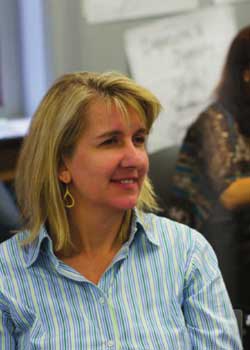Filed Under > Convocation
Learning to Lead Change
Theresa Perrotta's experience in the College's new XMA program could came at the right moment in her career -- and in the evolution of her company
Theresa Perrotta’s experience in the College’s new XMA program came at the right moment in her career – and in the evolution of her company
As Chief Financial Officer for Southern Specialties, a mid-sized produce company in south Florida, Theresa Perrotta feels that her central career challenge at this point is “less about the numbers and more about leading people.”
In a sense, that’s the crux of things for Southern Specialties as well. The company, which buys asparagus, beans, peas and other fruits and vegetables from growers in Central and South America and supplies them to major food service customers, club stores and retailers such as Sysco, Costco and Loblaws, has grown from a one-person operation to a $100 million business with more than 140 employees. The company seems poised to become much larger – but as a recent effort to upgrade its computer systems revealed, the path to change can be a bumpy ride indeed.
“Some people embraced the change, but others, who were deeply rooted in their routines, really resisted it,” says Perrotta, who led the project. “If we’re going to become more efficient, with better coordination, integration and the ability to follow strategy laid out by the leadership team, we’ve got to do a better job creating buy-in for and managing changes like this.”
With that goal in mind, Perrotta enrolled last spring in the first cohort of Teachers College’s new 45-credit, year-long Executive Master’s Degree program in Change Leadership (known as XMA). The program includes readings in organizational psychology, systems theory, group role play, executive coaching, conflict resolution, and leveraging diversity, as well as self-awareness exercises and, for each student, an ongoing action research project centered on a real-world issue back at the office. The students -- rising executives from businesses and non-profits – work primarily with program director Debra Noumair, who has consulted widely with public companies and non-profits; Warner Burke, TC’s Edward Lee Thorndike Professor of Psychology & Education and developer of the widely studied Burke-Litwin Model of Organizational Performance & Change; and visiting professor William Pasmore, Editor of The Journal of Applied Behavioral Sciences.
Perrotta’s action project in the program was to figure out how to tie team development at Southern Specialties to a strategy for “vertical integration” – alignment of all the players in the company’s product supply chain, from external growers and transport workers, to employees, to customers -- in ways that will increase profitability. She particularly benefited from the program’s focus on understanding diverse cultural perspectives and its emphasis on looking at change management through the prism of group dynamics.
“I grew up in the very culturally diverse area of South Florida and I’ve lived here most of my life, so it was incredibly enriching to not only think about my acceptance of other cultures, but also further my skills to understand and actively adapt to diversity,” she says. “In our company, I’m surrounded by people from other cultures, and thanks to the program, I relate to them now more effectively. I found that even just taking the time to ask a simple question of a colleague like, ‘Do you think in Spanish?’ – opened up an hour-long conversation about the different ways people communicate and created a new understanding. As both a person and a leader, I’m, much more focused now on making sure no one is ever silenced due to differences.”
Perrotta found exploring group dynamics theories and participating in group role-play exercises similarly helpful, particularly because of the insight she gained into how informal networks develop and operate.
“At one point, we attended a conference on group dynamics that included people from outside the XMA program,” she recalls. “Over the course of three days, working with over 100 strangers, we essentially built an organization organically and saw how informal networks come into play, and how attention to these networks are crucial to create structure out of chaos. Ultimately, you come to see that informal networks are a very important medium through which change happens.”
That insight led Perrotta to the realization that, in seeking to build better teams, Southern Specialties needs to focus beyond the boundaries of the company itself.
“Our definition of team needs to include our vendors, growers and customers,” she says. “To be really effective and competitive, I see that we need to create vertical alignment among these groups, so that we’re all working toward the same goals. Doing this requires sharing information and building trust.” At the same time, it became clear to her that before bringing external partners into the fold, the company needs to build greater trust among its own employees – for example, by revamping its pay-for-performance bonus plan to ensure a more even-handed distribution of rewards.
But for Perrotta, the XMA program yielded still another “light bulb moment” of potentially even greater importance.
“Our company is unique in that the founder is still our CEO,” she says. “I realized that a lot of the culture of the company comes straight from him and the weight of his influence. We have benefited greatly from his leadership and charisma, but the company is about to get a lot larger, and by definition, that means the culture is going to need to be less about him and more about his leadership team. I shared that with him, and his keen insight impressed me in how he sees this and understands that it’s ultimately his responsibility to set change in motion.”
Obviously, Perrotta’s XMA experience was personally enriching. Clearly it could pay big dividends for Southern Specialties for years to come.
Published Monday, May. 14, 2012
